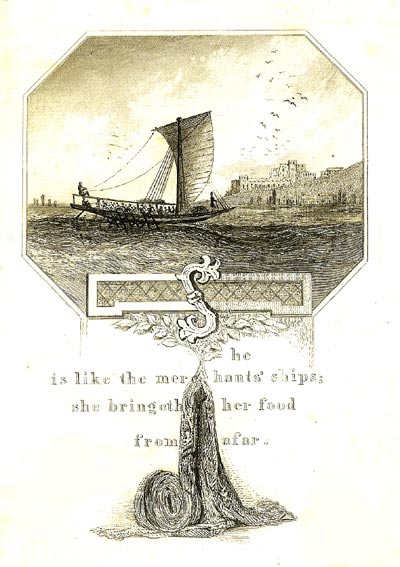
























SHE IS LIKE THE MERCHANTS' SHIPS;
SHE BRINGETH HER FOOD FROM AFAR.

The merchants' ships, in king Solomon's days, might, indeed, be said to bring their cargoes from afar. If we look at the record of the sea voyages made at this time, when the Hebrew king was assisted by Hiram, who furnished him with "shipmen who had knowledge of the sea," we shall find that they occupied a very considerable period. "For the king had at sea a navy of Tharshish with the navy of Hiram: once in three years came the navy of Tharshish, bringing gold, and silver, ivory, and apes, and peacocks" (1Ki 10:22). The Phoenicians, who resided on the north‐west of Palestine, are known to have had a commercial settlement, called Tartessus, on the Atlantic coast of Spain, near to the modern Cadiz; and whatever may be the various opinions respecting the situation of ancient Ophir, there is little doubt that this port was the Tharshish of the Scriptures. In the imperfect state of navigation, the voyages, performed as they were in small and ill‐constructed vessels, would seem to the Israelites "afar" indeed, and attended with very considerable peril.
But as food rather than other merchandise seems alluded to in the text, it is probable that the ships which brought corn from Egypt are here referred to. Although the ancient Hebrews were decidedly an agricultural community, and the rich valley of Palestine abounded in corn and wine, yet in seasons of dearth, as well as on other occasions, the Jewish people appear to have traded with Egypt for corn. On the fertile lands of that well‐watered country, corn grew so abundantly, that Egypt was the general granary of the East; and the touching narrative of Joseph and his brethren at once occurs to the mind, as an instance in which men went down into Egypt to buy corn.
The Israelites were by no means a maritime people; yet bordered as the Holy Land was by the Great Sea, now called the Mediterranean, which was the very highway of commerce, and familiar as they were with the Nile, on whose shores their fathers had served a hard service to the line of Pharaohs, they doubtless had many ships of burden, which were, at least, as well‐constructed as those in the western parts of the world at the same period of time. It must be remembered that their vessels were almost exclusively ships of merchandise. As yet, no battle‐ship had carried proud defiance to the peaceful shores; no cannon thundered its awful challenges on the deep: but the ship, in its occasional course over the waters, brought from afar the luxuries or the food of other lands, and bore in its welcome progress nothing to fill the heart with sorrow, or to leave a trace of that anguish and desolation which war brings so often now over the distant sea.
Very early mention is made in Scripture of ships. "Zebulun shall dwell at the haven of the sea; and he shall be for an haven of ships" (Gen 49:13), was the prophecy of the dying patriarch, as his eye, though dimmed to the sights of this world by the film of death, glanced forth and kindled at the view of futurity: and yet no regular trade by sea seems to have been established in Solomon's day, since he was obliged to seek aid from Hiram. Many beautiful spots on the shores of the sea are familiar to Scripture readers, and the vessels which floated on the Lake of Gennesareth were often honoured by the presence of Him, who disdained not the poor and the lowly, but gathered his apostles from among fishermen, and standing on the prow of a Jewish vessel, delivered to the people on the shore those beautiful parables, and those teachings of heavenly love and wisdom, which brought many to his feet as his disciples, and are now the treasure of millions of hearts, to whom the truths taught by the Saviour are dearer than gold or silver, more precious than life itself.
The Jewish matron, whose various kinds of manufacture are so specifically named, would have much to offer in exchange either for corn or other commodities, which the merchants' ships convey. Garments, made of fine wool or of hair stuffs; gorgeous tapestry wrought by her own hands; fine linen girdles-all were suitable objects of barter; and the rich clusters of grapes which her vineyard could furnish, and the well‐dried flax from her fields, constituted a store, from which something might be well spared. It seems probable, however, that the articles chiefly sent by her, either to distant tribes, or perhaps occasionally to lands beyond the seas, were those costly and magnificent dresses, which form the wealth of the eastern female, and which are highly scented with perfumes, and laid up for many years, to be brought out only on important occasions. The use of dresses also as presents, in the East, would render the barter of them a very likely and considerable source of profit, and this would enable this Jewish lady, whose intelligent and well‐devoted industry is so often commended, to procure for her family some of those enjoyments from afar, which the home produce would not supply.
The Blue Letter Bible ministry and the BLB Institute hold to the historical, conservative Christian faith, which includes a firm belief in the inerrancy of Scripture. Since the text and audio content provided by BLB represent a range of evangelical traditions, all of the ideas and principles conveyed in the resource materials are not necessarily affirmed, in total, by this ministry.
Loading
Loading
| Interlinear |
| Bibles |
| Cross-Refs |
| Commentaries |
| Dictionaries |
| Miscellaneous |
